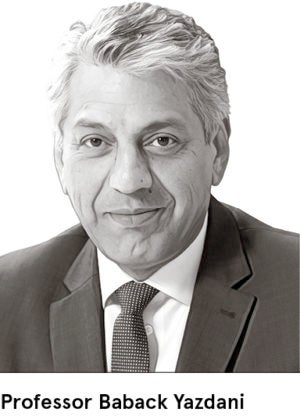 For almost four decades, Nottingham Business School (NBS) has been an innovative force and its star-studded list of alumni, spanning all sectors of the economy, is evidence of the diversity of garlanded leaders it nurtures.
For almost four decades, Nottingham Business School (NBS) has been an innovative force and its star-studded list of alumni, spanning all sectors of the economy, is evidence of the diversity of garlanded leaders it nurtures.
Dave Lewis, chief executive of Tesco, and Nick Beighton, chief executive of ASOS, as well as Sir Roger Carr, chairman of BAE Systems, and Air Marshal Sir Baz North, plus Crista Cullen, hockey Olympic gold medallist, are but five successful graduates.
However, the business champions of tomorrow will arguably be even better prepared by NBS, located in the ultra-modern Newton building in the heart of Nottingham, thanks to its increasingly heavy accent on experiential learning and, more recently, the personalisation of study.
In this digital age, when change is the only constant, experiential learning and personalisation will become strong foundations for the leaders of tomorrow.
These two elements have been strengthened under the aegis of Professor Baback Yazdani, dean since 2007. NBS’s progressive approach has elevated its status from regional establishment to one of the world’s leading business schools.
Indeed, it was the first business school to embrace a lean operating system and its level of graduate employability, at 90 per cent, is among the highest in the UK this year, according to the latest
Destination of Leavers from Higher Education statistics.
“To achieve that employment rate is incredible for the large size of our business school,” says Professor Yazdani, whose background spans engineering at Warwick University and the global auto industry.
“We have 6,000 students and 240 core academics. Experiential learning is in our DNA and we have a passion to keep our students at the heart of what we do. The business school does not exist to serve itself; its purpose is to produce top-quality graduates, create knowledge industry needs, and advance the science of business and management.”
In-the-field experience is an “equaliser” for students from less advantaged backgrounds. “Around a quarter of our student body at Nottingham Trent University and NBS comes from a difficult economic background,” says Professor Yazdani. “And the transformation that happens here has an impact on the social mobility in this country due to the large number of and reach of our graduates. The reasons for that are the experiential learning we put them through and the holistic personalised student experience.
You can teach students the theory and practice that in a safe environment, through simulations, case studies and in a laboratory. But then we want them to experience a paid placement, or an internship or a real project, so they observe that theory in reality and reflect on that. This learning is far deeper than any other.
“These experiences look so much better on a curriculum vitae, and students are able to impress in interviews and examinations because they have genuine examples to call upon.
“Also, through experiential learning, the students build up networks and that is very important – this is where the less advantaged are equalised with the more privileged.”
Keeping tabs on the progress of all NBS students and, moreover, encouraging them has never been easier. Each one has detailed information on the student dashboard, powered by data-hungry algorithms. “It is the most advanced analytics tool in the country, which we helped to develop, and allows us to understand every student at an individual level,” says Professor Yazdani.
Deputy dean Melanie Currie was one of the chief architects of the student dashboard, piloted some years ago and swiftly adopted by all at NBS. “We wanted to be proactive on the engagement front,” she says. “This allows our academic mentors to have richer conversations with mentees and you can work together to help them improve. By providing them with more work and support, they can gain more belief and confidence in themselves, and greater resilience. These small steps help propel them even further when
they graduate.”
The student dashboard is popular and successful. “We suggest a minimum of 20 hours of continuous professional development that each student has to do as part of their personalised learning,” says Ms Currie. “Many of them complete 100 or even 200 hours. Increasingly, the student experience is not about simply going to class or the lecture hall; it is about maximising university opportunities, and in this way these experiences can truly be transformative and life changing.”
MBA programmes leader Paul Caulfield agrees that industry leaders require more skills, and these can be honed at NBS through experiential learning and personalisation. “Future leaders must be empathetic translators and responsible leaders,” he says. “They have to speak to so many different constituents and stakeholders. They can’t be trapped in the headlights of the three-month returns, but have to be thinking much longer term and beyond their own tenure as well. Courage, curiosity and collaborative leadership are the most important qualities my students are telling me they need.”
NBS is not resting on its laurels. Professor Yazdani concludes: “We are trying to become known globally for deepening personalisation in higher education. Every year we innovate some more. It’s a bit like racing: if you keep working so you are slightly faster at each lap, you will gain a greater advantage over a period of time.” Without doubt, a qualification from NBS can put chief executives of the future in pole position.
For more information please visit www.ntu.ac.uk/nbs




